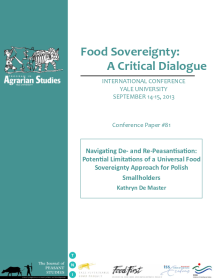Ideas into movement
Boost TNI's work
50 years. Hundreds of social struggles. Countless ideas turned into movement.
Support us as we celebrate our 50th anniversary in 2024.

Characterizing food sovereignty and neoliberal food production ideologies as dichotomous and oppositional, the first as positive and enriching and the second as negative and impoverishing, has given the food sovereignty movement some heuristic heft. However, presenting these two approaches as universal ideal types may overlook the diverse contexts they engage.

More over, an emphasis primarily on the differences between these two models with respect to economic transitions may al s o overlook significant issue s of culture and identity that inform the adoption of or res is tance to food sovereignty principles.
I use an example of peasant organic agriculture in Poland to explore the importance of cultural contextualization and identity in considering how FS princi ples will be operationalized among ideologically divergent communities. Situated at an historical crossroads, since Poland joined the E.U. in 2004, Polish agriculture is experiencing a host of transitions, including what has been termed "de - peasantisation ."
Simultaneously, other E.U. policy initiatives fost er a kind of neo or re - peasantisation, in which non - peasants or former peasants reconfigure forms of traditional production characterize d by “pluri - activity” and “multifunctional” farms (e.g. see Van de r Ploeg 2011).
The causes and impacts of these transitions will significantly influence the degree to which Polish peasant smallholders are able to achieve food sovereignty. I argue that rather than facilitating collaborative dialogue around policy initiatives that might benefit Polish peasant farmers engaged in these transitions, universal models for food sovereignty risk retrenchi ng and accentuating existing dualisms between the “cosmopolitan” Western E.U. and many Polish smallholders.
I suggest that this may unintentionally strengthen previously suppressed, far - right nationalistic aims and visions of small but influential subsectors of Polish peasant farming. This is particularly problematic when considering the cultural legacies of communism and l ong - standing entrenched mistrust of social movements associated with grand, universal schemes. I conclude by arguing that if the food sovereignty move ment is to be relevant for Polish smallholders navigating current transitions, it must acknowledge the li mitations of universal approaches and carefully parse out the ideologically uneven terrai n of Polish peasant agriculture.
Kathryn DeMaster, Assistant Professor of Agriculture, Society and Food Security, Department of Environmental Science, Policy, and Management, University of California Berkeley Professor DeMaster’s primary scholarship explores rural transitions, agri-environmental policies and incentives, diversified farming systems, and food justice/food sovereignty. Kathryn grew up on a farm in NW Montana, received her PhD from UW-Madison in Wisconsin, and most recently held a visiting position at Brown University. She joined the Department of Environmental Science, Policy, and Management at UC Berkeley in 2013.
Food Sovereignty: a critical dialogue, 14 - 15 September, New Haven.